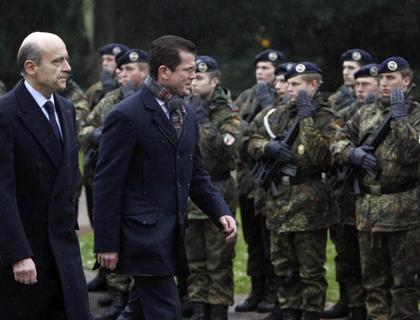States take back the initiative. Paris, Berlin, Warsaw write to Cathy…

The letters follow one another... After the letter from the Belgian Pieter De Crem, summarizing the informal debates in Ghent (1), on behalf of the Defense Ministers, the German-Swedish paper (2), here is the letter from Michèle, Alain, Guido, Karl Théodor, Radek and Bogdan addressed to Cathy Ashton.
Signed by both the Ministers of Defense and Foreign Affairs of the three countries that make up the Weimar triangle (M. Alliot-Marie and A. Juppé for France, G. Westerwelle and KT zu Gutenberg for Germany, R Sikorski and B. Klich for Poland), it is indicative of a certain malaise which reigns in certain Member States over the ambient sluggishness. If the tone remains polite, the unusual length of the letter (5 pages) and the words used (despite the periphrases of convenience) sound more like a call to action for the High Representative for Foreign Affairs and Security Policy from the EU, Cathy Ashton.
"to give new impetus to the CSDP (...) through concrete measures"
The timing of this missive, dated December 6, is also symbolic. Prepared for several weeks (*), it was presented to the COPS, political and security committee, on December 10. Or just the day after the first Council of Defense Ministers, chaired in person by Cahty Ashton, which demonstrated, if it were still necessary, the High Representative's weak interest in the development of an autonomous defense policy. But the Member States do not hear it that way. "We must give new impetus to the European security and defense policy in full complementarity with NATO. Your personal investment in this business will be essential.
It is necessary to move on to more concrete, they underline: "Lessons learned must be turned into concrete actions. (...) We want the Union to strengthen its contribution to international peace and security and improve its ability to deal with threats to its security".
“In a context of severe financial constraints, we must be ready to take bold decisions. The CSDP must become both more efficient and more efficient“ write the six signatories, who identify four areas of progress.
"The CSDP must become both more effective and more efficient"
1st point: EU-NATO cooperation
This cooperation must go through a "cooperation in theaters of operation", the partnership "essential" between the European Defense Agency and the Allied Command for Transformation (ACT). But other areas can be exploited, "including cyber defense". Could the High Representative have taken the wrong road so far?
2nd point: capacities permanent planning and conduct of operations
The signatories identify three avenues: improving the capacity to plan and conduct civil-military and military operations and missions by relying on existing structures (in other words, what can come close to a civil-military HQ), the improvement of military driving capabilities (in other words the long-awaited military HQ), the adaptation of battlegroups to "complex business needs", in particular through the strengthening of civil-military capacities, such as the possibility of "build modules that include full military and civilian capabilities".
3rd point: battlegroups
The three countries that will pool a battlegroup in the first half of 1 intend to experiment with new possibilities. They "thus reaffirm their desire to deploy the battlegroup" and hear the "make it even more available so that it can react better to operational emergencies". targeted advanced planning will be implemented, in cooperation with CSDP structures. And the participants are counting on the revision of the Athena mechanism, which will be started under the Polish Presidency, which could allow a "common funding, aimed at improving the readiness, deployability and cost-effectiveness of battlegroups(particularly at the strategic transport level).
4th point: industrial capacities
To restructure the defense industrial and technological base (BITD), the European Defense Agency has a "substantial role", underline the signatories, who ask the High Representative to present "in right time"a report"on the progress made in this area which could serve as a basis for an in-depth discussion at ministerial level".
start the debate "as soon as possible"
Germany, Poland and France finally propose to "start a reflection process as soon as possible". They ask him to register "this item on the agenda of the next meeting of the Foreign Affairs Council", the objective being to obtain "concrete results under the Polish Presidency in the second half of 2011". In other words, no more wait-and-see attitude, it's urgent, hello action, Madam High Representative!
(*) This letter had in fact been prepared for several months. But if Warsaw and Berlin had agreed, it seems, Paris was still procrastinating.
Read also:
- (1) Pieter de Crem writes to this “Dear Cathy”, a real roadmap
- (2) Germans and Swedes take the initiative
Download the letter in french - the letter in english



